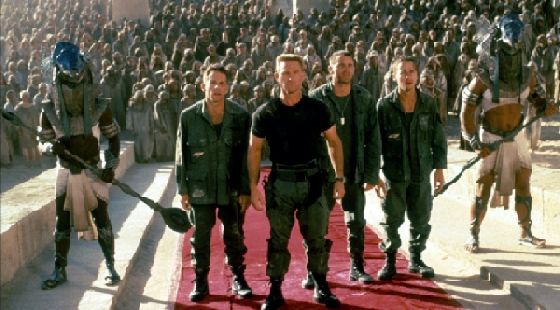Stargate (1994) 
“It Will Take You A Million Light Years From Home”

Director: Roland Emmerich
Cast: Kurt Russell, James Spader, Jaye Davidson
Synopsis: An interstellar teleportation device, found in Egypt, leads to a planet with humans resembling ancient Egyptians who worship the god Ra.
Although I’m not a particularly massive sf fan, Stargate was such a success back in 1994 that I had always intended — but never got around to — watching it. The movie was a huge box office success back in ’94, and it spawned a number of TV series, so it had to be pretty good, right? Even if it was directed and co-written by Roland Emmerich, a man notorious for making bloated, soulless epics, its huge fan-base meant it had to have some redeeming features, right? Well, erm, no, as it turns out. Stargate is as big and empty as the big, empty desert in which it takes place.
It opens in Egypt in 1928, with an archaeological dig uncovering a huge ring which didn’t once adorn the finger of some unimaginable giant but, as we later find out, provides a portal to another dimension. Fast forward to the present day, and the combined minds of America’s military boffins are still struggling to come to grips with the sequence of hieroglyphics that provide the key to unlocking the workings of the portal. Catherine Langford (Viveca Lindfors) enlists the aid of crackpot theorist Dr Daniel Jackson (James Spader), whose theories are widely poo-pooed by his peers. Jackson sports a floppy, girly hair-cut and John Lennon specs, and talks with a soft, cultured voice. Not exactly your standard issue sf-action movie hero, then, which is where granite-jawed, steely-eyed, buzz-erm-cutted Kurt Russell comes in.
Russell plays Colonel Jack O’Neil, a former military man who is on the verge of suicide following the accidental death of his child during an unsupervised child-firearm interface that unaccountably turned nasty. And that’s about as far as Emmerich and Dean Devlin’s script goes towards providing any back-story about, or depth to, the movie’s characters. Anyway, O’Neil’s drafted in to lead a unit into the other side of the portal once Jackson’s cracked the hieroglyphic code — which takes him all of two minutes’ screen time.
It’s at this stage in the story that the special effects take centre-stage, and the journey into another dimension is depicted as a 2001 Space Odyssey style trip, just not as good. The men find themselves in a sun-drenched desert land of ancient Pyramids, but without the market traders, beggars and tourists of our dimension. This land is unsullied by the curse of commercialism, which is at least one thing in favour of its ruler, an alien who has unaccountably assumed the androgynous form of Jaye Davidson. Other than that, though, the despotic tyrant keeps the populace in line by hiring thugs who dress up as Gods to oversee the building of new pyramids.
The reason the military selected a suicidal former soldier for the mission becomes apparent once O’Neil and his men are on the other side of the portal. O’Neil has travelled with a nuclear bomb in his travel bag, which he has been instructed to detonate if things turn hairy which, of course, they duly do. But, wait! Why don’t they just disable the portal at our end? Because this is Emmerich-world, that’s why — so no other explanation is deemed necessary. He’s giving you aliens and explosions, what more do you want? As usual, Emmerich substitutes spectacle for substance. The storyline is so cliched that you can predict its every ‘twist’ and ‘turn’. There’s even a timer on the bomb which counts down from seven minutes — although it feels like it takes twice as long to do it, which, come to think of it, pretty much goes for the entire movie.
Because the characters are nothing more than instruments whose purpose is to drive forward the plot we don’t really give a damn whether they get blown up or not. Jaye Davidson’s malevolent alien might have been a source of inspiration in the hands of more talented writers, and even allowing for Davidson’s limited acting range (he did well to get out of the business when he did), it’s entirely possible that he could have made a compelling figure out of him. But, no. He has the occasional hissy fit, and his eyes glow when he’s about to do something nasty, but other than that he’s just as dull as the rest of the cast. And Spader is as insipid a leading man as you’re ever likely to encounter. It’s not his fault — the part’s just poorly conceived: he’s the kind of character who, if you weren’t looking straight at him, you’d forget he was there.
Stargate fails on all counts, so just why it was such a success is something of a mystery. Was it really just the light show that attracted the crowds? Probably. Time is showing that cinematic storytelling has descended to the level of comic book characterisation and simplistic, bite-size themes, and the origins of this decline can be traced directly back to fodder like Stargate and The Mummy.
(Reviewed 27th July 2013)
httpv://www.youtube.com/watch?v=yd_C8YE99Eo
